Car Makes Clicking Noise When Turning: 6 Causes
Clicking noises while turning can result from a worn CV joint, damaged suspension components like ball joints, control arms, or tie rod ends. A clicking sound can also be caused by a damaged wheel bearing hub, connecting the wheel to the axle. This issue might be accompanied by vibrations or wobbling. Loose lug nuts can additionally create a slight metal clicking noise during driving.
Few sounds raise a car owner’s hackles like an odd clicking when turning the steering wheel. This unwelcome chorus likely signals mechanical trouble.
While these strange noises may simply indicate a loose component, persistent clicking while turning commonly betrays suspension or steering faults needing attention. Like a sputtering engine, the sound produces discomfort and concern. But not to worry – diagnosis and remedy may prove simpler than expected.
In this guide, we will discuss different causes of clicking noise from car as well as some quick methods to identify and fix them.
For you guys, I’ve built an interactive tool to aid in diagnosing car issues. It takes you through simple steps. Don’t forget to explore it.
In the last section, I’ve included comments from forums where users share firsthand experiences with a clicking noise in cars when turning. Be sure to check out that section for real insights.
- Clicking while turning can mean worn car parts like CV joints or wheel bearings.
- It can also come from loose lug nuts or small rocks in brake calipers.
- Bad strut mounts and suspension joints click too when steering.
- Stiff steering with clicks may indicate power steering issues.
What is My Personal Experience With Clicking Noise When Turning?
My aunt drives an older Toyota Camry that recently started making a clicking sound when turning left or right. I looked under the car and noticed a cracked CV boot.
I removed the axle, inspected the joint, and found significant wear on the bearings. I replaced both CV axles, being careful to properly grease the new boots. The clicking is now gone and my aunt’s Camry turns smoothly again.
What Exactly Is Clicking Noise In Vehicles And How It Differs From Other Noises?
When diagnosing car troubles, a clicking noise stands apart from knocks, whines and rattles.
With each turn of the engine, the clicking repeats at a steady tempo. This distinguishes it from the arrhythmic grinding of worn brake pads, the irregular rattling of a loose exhaust pipe or the erratic whine of a failing power steering pump.
The crisp, tapping click originates in a specific mechanical or electrical component. A knock resonates through the chassis while a click pinpoints the source.
The high pitch indicates a small part rapidly opening and closing, like an actuator or relay. A lower pitched knock implies vibration and friction between larger components.
Other misleading noises include:
- Grinding: A grinding noise typifies the abrasive scrape of worn brake pads against naked rotors. Allowed to continue, this metal-on-metal erosion can damage rotors beyond resurfacing.
- Squeaking: The high-pitched squeal upon turning alerts of a struggling suspension or steering component. Ball joints, bushings and other chassis parts plead for lubrication.
- Whining: Acceleration accompanied by a rising whine directs attention to the gear train or differential. Lack of fluid starves the gears.
- Rattling: A rattling sound draws focus to a component shaking loose. The exhaust, dashboard or something underneath can be set right with a tightening or replacement.
You can also read my guide on causes of groaning noise when backing up.
What are Causes Of Car Clicking Noise On Turns?
Here are the causes of car making a clicking sound when making sharp turns
1. Damaged CV Joint or CV Axle

If your front wheel drive car produces a clicking noise when turning, the culprit is likely a damaged constant velocity (CV) joint. This critical drivetrain component connects the wheel to the axle while allowing suspension movement.
The CV joint’s flexible coupling transmits power while permitting the wheel to turn smoothly. Without it, the steering would bind and torque would not reach the tires.
Two CV joints exist per axle. The outer attaches to the transmission, while the inner links to the wheel.

When the outer joint fails, it clicks. The inner joint clunks or grinds when damaged. Both joints should be inspected since isolating the sound’s origin proves difficult. I have explained this in my guide on “can a bad CV joint damages transmission“
What causes CV joint failure?
- Insufficient lubrication: Grease inside the rubber boot must lubricate the joint. Dried out grease from a cracked boot can induce failure.
- Wear: Constant motion inevitably wears components. Cracking or bearing damage can result.
- Contaminants: Debris entering through a torn boot accelerates wear.
- Physical damage: Hits to the CV joint from potholes or curbs can inflict harm.
When you remove CV joint rubber boot and bearing, you need to also inspect the splines on the CV shaft/axle. If the splines are worn, it can cause a play in the CV joint, which can result in clicking noises.

To remove the CV axle, you can watch the following video:
2. Strut Bearing Damage Creating Noise During Turns

The strut bearing allows the strut to swivel easily when you steer the wheel. This component, also called a strut mount, connects the strut and vehicle body. It helps absorb bumps so passengers enjoy a smooth ride.
The strut bearing has several parts. A metal bearing spins smoothly. Rubber dampens noise and vibration. A mounting plate secures it to the body.

Over time, the rubber cushion can become damaged. This lets the metal plates rub together. A clicking noise may happen when turning, especially at low speeds or on bumpy roads. Misalignment can worsen the noise.
How strut bearing goes bad?
The strut bearings in your vehicle take a beating. Here are the most common reasons they fail before their time.
- Normal wear and tear grind them down. All those miles you drive cause constant vibration and movement in the strut assembly. This natural wearing process speeds up on rough roads or with aggressive driving.
- Lack of grease leaves them high and dry. Strut bearings rely on lubricant to smoothly glide without excessive friction. When they don’t get fresh grease, the bearings get damaged and wear out faster. Over time, the existing grease loses its slipperiness too. Then the bearing balls rub and grind, producing clicking or popping when turning the wheel.
- Moisture and rust decay them from within. In humid areas or climates with frequent rain, moisture invades the strut housing. It corrodes and rusts the bearings, leading to premature failure.
3. Loose Wheel Lug Nuts Clicking When Changing Direction

Like a baby in a secure carrier, your wheels are held fast to your car by trusty lug nuts. These crucial metal bolts grip the wheel to the hub, joining axle and brake disc. Proper tightening torque locks them in place.
But nothing lasts forever. Over time, those lug nuts loosen and rattle. Soon your wheels wobble and clunk around each turn. The noise amplifies when accelerating or cornering sharply. Loose lug nuts spell trouble.
What causes such loosening?
Suspension or tire work can disturb lug nuts, leaving them unmoored. Likewise, rough roads and potholes stress and stretch lug nut torque. With enough bumps and thuds, they work free.
4. Worn Suspension Parts Clicking Through Steering Wheel Turns

Suspension components are the parts of a car that connect the wheels to its frame. Their job is to soak up bumps and vibrations from the road so you have a smooth ride.
The main suspension pieces are:
- Struts
- Shock absorbers
- Anti-roll bars
- Control arms
- Tie rods

If you hear clicking sound on turning, the problem is likely worn out ball joints or bushings.
Ball joints attach the steering knuckles to the control arms. This lets the wheels move up and down. Worn out ball joints can make clicking or popping noises when you turn the wheel.
Bushings are small rubber pieces throughout the suspension. They cushion things and reduce vibration. But over time, bushings crack and wear out. Damaged bushings can also click when you turn.
How to fix?
Like aching joints, worn ball joints on vehicles can sometimes get by with a bit of grease and adjustment. Other times, though, the damage is too great and full replacement is needed.
When greasing up an aging ball joint, a grease gun’s pressure nozzle or a thin needle under the boot does the trick. The needle carefully lifts the rubber boot to sneak fresh grease directly onto the ball and socket. Be sure to seal up the needle hole after to keep grime out. Equip your grease gun with a skinny nozzle to hit the target.
5. Small Rocks Stuck In Brake Caliper Clicking On Turns

The brake caliper holds the brake pads and squeezes the rotor to slow or stop the wheels. Gravel stuck in the caliper can make the pad rub the rotor unevenly.
This causes a clicking sound when turning as the uneven pad touches the rotor. It also wears the pads unevenly, hurting braking and safety. I have personally experienced that clicking sound at low speeds due to stuck gravel between brake pads and rotor.
Driving on gravel roads leaves small rocks on the tires. These get lodged in the caliper. The gravel in the caliper then clicks when you turn as it makes the pad rub unevenly.
6. Stiff Steering From Faulty Steering Pump or Insufficient Power Steering Fluid

Power steering relies on hydraulics to give extra force when turning the steering wheel. This makes steering much easier at low speeds or when stopped compared to manual steering without assist.
However, problems with the power steering pump or fluid can lead to noticeable issues while driving. One common symptom is a clicking or popping noise from the front when turning the wheel.
The heart of any power steering is a hydraulic pump. The pump connects by a belt to the crankshaft pulley on the engine.
As the engine runs, the pump spins too. The pump pressurizes the fluid and pushes it through hoses to the steering gear.
When steering feels stiffer and needs more effort to turn, it usually signals an issue with the system.
Two common causes of stiff steering are:
- Faulty Steering Pump: The pump can wear out over time and not build enough pressure. Without adequate pressure, the extra force can’t reach the steering gear when needed.
- Low Steering Fluid Level: Fluid levels drop gradually from seepage and evaporation. If too low, the pump draws in air bubbles. Air compresses, unlike fluid. Compressing air absorbs energy and prevents proper pressure buildup.
How to inspect?
You should examine the power steering pump for leaks. You should also check the power steering fluid reservoir level. Significantly low levels well below the “Full Cold” mark require a system inspection for leaks and hose cracks.
Air trapped from low power steering fluid draws moisture promoting internal corrosion. A flush helps clean out any contaminants.
Final Thoughts
In summary, clicking noises when turning commonly stem from worn CV joints, strut bearings, suspension components or loose lug nuts.
Gravel in brakes can also be problematic. Inspecting rubber boots, bushings, ball joints and wheel hardware can pinpoint issues.
Replacing damaged CV joints and strut mounts, tightening lugs, servicing suspension parts and clearing debris restores smooth turning. Maintaining lubrication and torque specs prevents premature wear.
Addressing clicking sounds promptly avoids further drivetrain damage or wheel detachment.
Some First Hand Experiences Shared By Users In Different Communities
Our team conducted research across various online communities, forums, and subreddits to gather user comments and opinions on “clicking noise in car when making a turn”.
User 1 says:
Experienced a similar issue with my 2015 Ford Ranger. It was a bad wheel bearing. The noise was more of a grinding sound, especially when turning left. Replaced the bearings, and it solved the problem.
User 2 says:
Had a clicking noise when turning in my ’09 Honda Odyssey. Turned out to be a worn CV joint. I noticed it got louder during sharp turns. Replaced the CV axle, and the noise was gone.
User 3 says:
I had this issue in my 2018 VW Golf. It was due to loose lug nuts on the front wheel. Tightened them, and the clicking stopped. Always check the simplest solutions first!
User 4 says:
Own a 2017 Subaru Crosstrek. The clicking noise during turns was due to a failing CV boot, which led to CV joint damage. Replaced the entire CV axle. Always check your boots for cracks or leaks.
User 5 says:
My ’13 Toyota Sienna had this problem. The culprit was the power steering fluid being low. Topped it up and the clicking noise during turns disappeared. Always check fluid levels.
User 6 says:
I drive a 2016 Charger. The clicking noise turned out to be from the brake pads. They were moving slightly in the caliper during turns. I changed retaining clips, and it fixed the issue.
